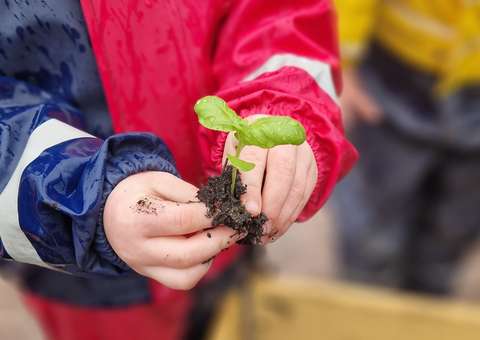Small steps towards a greater understanding of nature

Eläköön piha! ("Long Live the Yard!") is a pilot focused on developing materials to support young children's connection with nature and their ability to read and interpret natural phenomena. The project includes creating a framework and a resource package to be used in early childhood education, in collaboration with Environmental School Polku. This initiative is part of the Sustainable Future Districts Pilot Program.
New solutions for promoting sustainable mobility and enhancing urban biodiversity are being developed and tested in Espoo this year. One of these initiatives is the Eläköön piha! project, which focuses on supporting children's and families' interaction with nature through early education. Together with local daycare centers, the project produces tools that promote and make use of the diversity found in daycare yards.
The Eläköön piha! pilot is implemented by Environmental School Polku in collaboration with the City of Espoo. Environmental School Polku is part of the Helsinki Metropolitan Area Reuse Centre. The pilot is executed with Maininki and Tillinmaki daycare centers with the aim of being able to share the new tools with all daycare centers across Espoo. Feedback is collected from daycare staff throughout the pilot.
Little Gardeners, Big Discoveries
During the pilot, children are given new opportunities to explore and care for nature in their daycare yards. In May, the children of the pilot daycare centers got to plant seedlings they had grown themselves. Potatoes, basil, and eager little hands all went into the soil. The children will care for the plants together with the daycare staff throughout the summer.
“Caring for plants teaches you the names of different plants and their needs for growing. At the end of the summer, we’ll celebrate with a harvest festival, where the children can enjoy the vegetables they’ve grown themselves," says Elena Lehtimäki, an environmental education specialist from Environmental School Polku. In addition to food, they have also planted pollinator-attracting flowers. Biodiversity is a core theme of the project, and children are also introduced to other life forms found in the yard, such as trees and bugs.
"The Eläköön piha! pilot supports the sustainable development education goals of Espoo's early childhood education plan (2022). In addition to increasing staff knowledge, it offers children opportunities for participation and agency through nature education, such as planting and observing the growth of plants," adds early childhood education specialist Saara Salmi-Rautiainen.
The goal of the pilot is to strengthen children's connection with nature as well as with the origins of food. A bond with nature supports overall well-being. Growing one’s own crops helps deepen understanding of where food comes from, fosters appreciation for it, encourages healthy eating habits, and reduces food waste. Growing plants also allows children to observe natural cycles and biodiversity in action.
Another goal is to improve children's nature literacy, which means the ability to observe, understand, and interpret natural phenomena. Nature literacy includes understanding the interconnections in ecosystems: how, for example, plants need water and sunlight to grow. Developing this literacy is crucial, as deeper understanding fosters greater respect for nature.
Text: Jeremi Vahtera